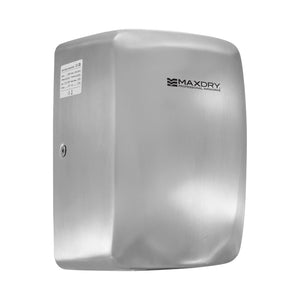Hand Drying Solutions: Choosing the Best Option for Hygiene and Sustainability
Maintaining the right indoor humidity level is essential for creating a comfortable and healthy living environment. While most people are aware of the discomfort high humidity can cause, fewer realize the potential health risks of high humidity. Prolonged exposure to excessive moisture in the air can lead to a range of humidity-related health issues, from respiratory problems to skin conditions. This article will explore the effects of excessive humidity on health, how it impacts different groups, and what you can do to manage it effectively.
1. Respiratory Problems and Humidity
One of the most common high humidity health concerns is its impact on respiratory health. When indoor humidity levels rise above 60%, it creates an ideal environment for mold and mildew to thrive. Mold and mildew health risks include allergic reactions, asthma flare-ups, and other respiratory issues.
For individuals with pre-existing respiratory conditions like asthma, the combination of humidity and asthma attacks can be particularly dangerous. High moisture levels in the air can cause airways to constrict, leading to shortness of breath, coughing, and wheezing. How does humidity affect people with asthma? It can increase the frequency and severity of asthma symptoms, making it crucial for asthmatics to maintain a controlled indoor environment.
Additionally, high humidity can worsen sinus issues. Can excessive humidity cause sinus issues? Yes, because moisture encourages the growth of dust mites and bacteria, which can trigger sinus infections and exacerbate allergies. To combat these issues, maintaining dry, clean air with efficient hand drying solutions like MaxDry hand dryers can help reduce the spread of allergens and bacteria in shared spaces.
2. Skin Conditions Caused by Humidity
Humidity doesn't just affect your lungs; it can also take a toll on your skin. High moisture levels can lead to a variety of skin conditions. Can high humidity cause skin problems? Absolutely. People living in humid environments often experience issues like acne, heat rashes, and fungal infections.
The constant moisture can clog pores, leading to breakouts, while the warm, damp conditions create a perfect breeding ground for fungi and bacteria, increasing the risk of skin infections. Moreover, bacterial growth in humid environments can cause skin irritation, itchiness, and even eczema flare-ups. Using energy-efficient hand dryers like MaxDry helps minimize excess moisture in bathrooms, preventing bacterial growth on skin after handwashing.
3. Allergies and High Humidity
Another significant health problem caused by humidity is its role in aggravating allergies. Dust mites, mold spores, and mildew flourish in damp conditions, and these allergens can trigger severe reactions in sensitive individuals. Allergies and high humidity often go hand-in-hand, with symptoms like sneezing, watery eyes, nasal congestion, and skin irritation becoming more frequent and intense in humid environments.
The impact of high humidity on children’s health can be particularly concerning, as children’s immune systems are still developing. Prolonged exposure to allergens can lead to chronic respiratory issues and a higher likelihood of developing asthma later in life. To improve air quality, ensure that communal spaces like schools and offices utilize eco-friendly hand dryers, which help reduce overall moisture levels.
4. Humidity and Indoor Air Quality
Excessive humidity doesn't just affect individuals directly; it also deteriorates overall indoor air quality. Poor air circulation combined with high moisture levels can create a stuffy, uncomfortable environment. The presence of mold, mildew, and bacteria in the air increases the risk of airborne illnesses. The negative effects of humidity on health extend beyond respiratory issues, contributing to headaches, fatigue, and general discomfort.
To prevent these issues, it’s essential to understand the link between humidity and indoor air quality. Regular use of dehumidifiers, proper ventilation, and best home hand dryers like MaxDry can significantly reduce humidity-related health issues. For more information on improving air quality, visit the Environmental Protection Agency’s guide on indoor air management.
5. Dehydration and Humidity Effects
While it may seem counterintuitive, high humidity can contribute to dehydration. When the air is saturated with moisture, the body’s natural cooling mechanism—sweating—becomes less effective. This leads to excessive sweating without adequate evaporation, causing the body to lose fluids quickly. Dehydration and humidity effects include dizziness, fatigue, and muscle cramps, especially in hot and humid climates.
Incorporating tools like low-energy hand dryers helps maintain balanced humidity levels in public spaces, indirectly aiding in regulating the body’s natural cooling processes.
6. Long-Term Health Problems Caused by Humidity
Prolonged exposure to high humidity can lead to chronic health issues. Persistent mold exposure, for example, has been linked to long-term respiratory conditions, such as bronchitis and chronic sinusitis. The health risks of mold due to excessive moisture include the potential for mycotoxin exposure, which can cause serious neurological and immune system problems in severe cases.
Additionally, individuals living in constantly humid environments may experience weakened immune systems, making them more susceptible to infections and illnesses. For workplaces and public environments, investing in energy-efficient hand dryers can contribute to maintaining optimal air moisture levels, preventing mold growth.
7. Managing Indoor Humidity to Prevent Health Problems
To mitigate the excess humidity health impacts, it’s crucial to maintain indoor humidity levels between 30% and 50%. Here are some practical tips for managing indoor humidity to prevent health problems:
-
Use a dehumidifier: This is one of the most effective ways to control humidity, especially in basements and bathrooms where moisture tends to accumulate.
-
Improve ventilation: Ensure that your home has proper airflow by using exhaust fans in kitchens and bathrooms, and by opening windows when weather permits.
-
Fix leaks promptly: Address any plumbing or roof leaks immediately to prevent moisture buildup and mold growth.
-
Monitor humidity levels: Invest in a hygrometer to keep track of your home’s humidity levels and adjust as needed.
In public and commercial spaces, switching from paper towels to hand dryers vs. paper towels solutions, like MaxDry hand dryers, can help control humidity while offering an eco-friendly alternative.
Conclusion
The health risks of high humidity are far-reaching, affecting everything from respiratory health to skin conditions and overall well-being. By understanding the effects of excessive humidity on health and taking proactive steps to manage indoor moisture, you can protect yourself and your family from these humidity-related health issues. Incorporating tools like eco-friendly hand dryers and maintaining good ventilation practices are small changes that can make a big difference. Don’t overlook the importance of maintaining a balanced indoor environment—your health depends on it.
Related Products
-
ThinMAX High Speed Hand Dryer - Black Coated Stainless Steel

- Regular price
- $427.60
- Sale price
- $427.60
-
SpaceMAX High-Speed Vertical Hand Dryer, Brushed Stainless Steel (Satin)

- Regular price
- $279.50
- Sale price
- $279.50



